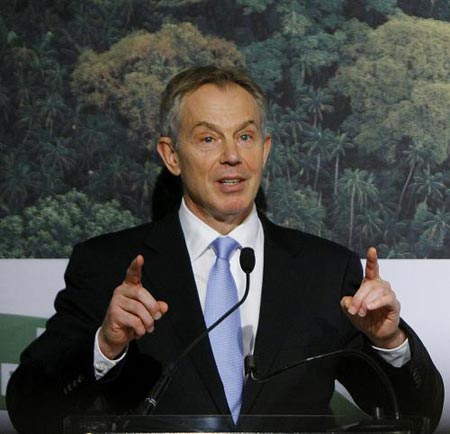Blair calls for talks to produce practical measures
Former British Prime Minister Tony Blair called for the ongoing Copenhagen climate change talks to translate the emission cut commitments into practical measures on Sunday.
He said these measures should be fair for both developed nations that have industrialized and created the problem of climate change and developing nations that must now industrialize to lift their people out of poverty.
|
|
|
Photo taken on Dec.13 shows Former British Prime Minister Tony Blair gives a speech in Copenhagen, Denmark's capital. Tony Blair called for the ongoing Copenhagen climate change talks to translate the emission cut commitments into practical measures on Sunday. |
"Copenhagen is where we need to make a policy. It is time to lift this issue out of the realms of a campaign and put it firmly within the framework of a credible, achievable policy for change," said Blair.
He suggested that Copenhagen should take the most ambitious level of commitments to cutting emissions. EU leaders recently agreed to reduce their emissions by 30 percent of 1990 levels. And the United States promised to cut emissions over the next decade "in the range of" 17 percent below 2005 levels.
"These commitments fall short of what the science tells us is necessary," said Blair.
Meanwhile, he called for working more ways to accelerate the cut in emissions, such as the trans-border efforts to end exploitation of rainforests and energy efficiency, which saves massively on emissions.
Blair also launched a report, with the title of "Doing the Deal: Key Elements for a Climate Agreement at Copenhagen."
"At the heart of the deal is the question of how collectively we put global greenhouse gas emissions on a path that minimizes the risk of dangerous and irreversible climate change," the report said.
In order to enable emission cut targets to be strengthened in the coming years, the report said that governments should put in place mechanisms that will allow ambition levels to be raised.
These include: setting themselves longer term targets, such as for 2025 or 2030; establishing a review mechanism that will be able to recommend deeper cuts, based on the latest scientific, technological and economic knowledge, with a first review in 2015;agreeing to develop Low Carbon Growth Plans that help as yet unidentified emission reduction opportunities to be uncovered; providing financial support for a fast start that enables immediate emissions reduction and builds the capacity for them to be scaled up.
 0 Comments
0 Comments








Comments